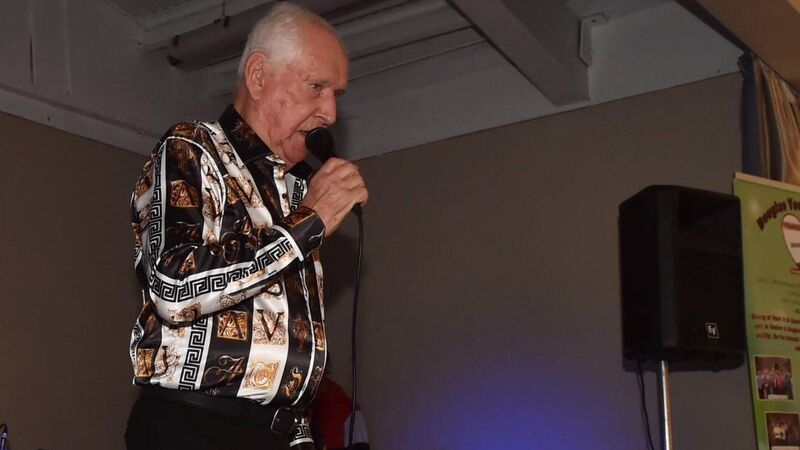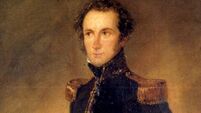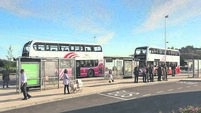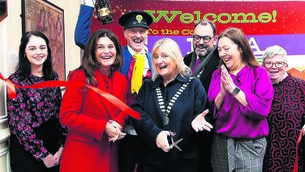John Arnold: A special day at the Pairc as I sang Amhrán na bhFiann

The competition has been run since 1925, when Midleton were the inaugural winners. In 1947, a cup named in honour of the famous Dungourney and Cork hurler Jamesy Kelleher was presented to the winners and since then that is the coveted prize that Junior teams strive to capture.
In last Sunday’s decider, Carrignavar, with a hurling pedigree dating back at least to the 1740s, captured the silverware for just the third time. They defeated a Seamus Harnedy-inspired St Ita’s by a single point after a fine game of hurling.
After the worst excesses of Storm Babette, we were poxed with two great days on Saturday and Sunday which meant the final was played on a perfect pitch in perfect condition.
I was honoured - and I use that word with it’s truest meaning - to be asked to sing our National Anthem, Amhrán na bhFiann, before the throw-in.
I’d been in Cork on the Friday for the unveiling of that fitting tribute to Michael Collins and joined the thousands on the Grand Parade in our anthem. On Sunday, to be honest, I was a bit nervous.
Now I’ve sang that song with gusto on so many great September Sundays in Croke Park and at venues all over Cork when the Bride Rovers hurlers in Green, White and Gold lined up for important games.
Sunday was different though, leading the singing ‘all on my own’. In the minutes leading up to the throw-in, I joked with Art Supple, the legendary showband singer and St Ita’s mentor - “Art,” says I, “I hope I’ll remember the words,” to which he immediately replied: “John, you can’t fatten the pig the morning of the fair!”
I’d heard a lot of wise sayings before but never that one - a bit like ‘Ni he la na gaoithe la na scolb’ - the windy day is not the day for the thatching - everything in it’s time, and be prepared.
Anyhow, the anthem went well - it never, ever fails to bring a wave of emotion over me - thanks for the moral encouragement, Art!
Well, the two pigs - as fat as mud now in preparation for Christmas - grunted as I fed them and they weren’t long polishing off a bucket of apples, potatoes and rolled barley.
Look, ye know I’m a fright for thinking random thoughts and putting two and two together and getting maybe 27! I thought of John ‘Red’ Kelly who in 1842 - three years before the Famine began - was accused and found guilty of stealing two pigs -we’ve no idea if they were ready for the fair or not!
One way or another, as a punishment for his heinous ‘crime’, Kelly was transported to Van Dieman’s Land. He married a woman from his native auld sod, Ellen Quinn, and they were the parents of the famous or infamous Australian bushranger Ned Kelly.
Cast in the mode of Robin Hood - ‘he robbed the rich, he helped the poor’ - Ned and the Wild Colonial Boy have been immortalised in song and story. We all know the line in the Clancy Brothers song, ‘he was born and raised in Ireland in a place called Castlemaine’, but there’s also a town called Castlemaine in Victoria, Australia!
Look, let’s not get too politically correct on these matters. Ned Kelly and Jack Duggan or Donahue are part of the rich fabric that interweaves Irish and Australian history and folklore and The Wild Colonial Boy sung with zest always gets the hair standing on the back of my neck - in much the same manner as Noreen Bawn, The Green Glens Of Antrim and My Home In Fermoy.
Nothing unusual about that, you might well say, and true enough, a month scarcely passes without a phone call, letter or knock on the kitchen door from someone looking for local ‘roots’.
This trio from Down Under were different in so far as I know their seed, breed and generation. Yet they all arrived here, more or less unannounced and all independent of each other, and to tell the truth I was so thrilled to meet them.
Mike Ahern was born in the village in 1890, son of another Michael and Mary Geary. Three years later, just up the road, in aptly-named Hightown, William Edmond Barry came into this world, born to James and his wife Hannah Dilworth. In 1902, Bill O Regan was born in Ballinwillin - his father was Patrick, a shoemaker, and another Mary Geary was his mother.
Mike, William and Bill would, no doubt, have known each other. They probably attended the local church and would have looked forward each September to the two famous Bartlemy Horse Fairs.
I knew Mike Ahern and Bill Regan when I was growing up in the 1960s but never met William Edmond Barry - he was dead before I was born. Mike is buried in Gortroe, Bill in Britway and William in Rathcormac. They are gone but not forgotten.
In conversations in recent days with Bryan Boru Ahern, Leonard Barry and Anne Sahb, I got a glimpse of what Irish heritage and pride of place is really all about.
Bryan’s father Jack, now over 90, left Ireland in the 1950s. A son of Mike and Mary, Jack heard tales around the open fire long ago about the Aherns’ and Gearys’ familial links with the Irish high king slain in 1014 and called his son after Brian Boru.
Leonard Barry recalled when he left Ireland for Australia by BOAC airline - the journey took three days with stop-over after stop-over. He’s often been back to Ireland and always comes here to what he considers his native parish.
His is a remarkable story that encompasses England and sectarian bigotry in Northern Ireland before he joined his sister in the vast expanse of Australia. His father joined the British Army as a Veterinary Surgeon - horses were then the ‘transporters’ for the troops all over the world.
Like so many others from around here, Billy O Regan, son of the shoemaker, and his wife Nance Healy went working to England in the 1950s. His daughter Anne spent a term with her grandparents in Ballinwillin in the 1960s and attended the local National School here.
In Australia now with many years and married to David Sahb, Anne keeps in contact with home on a weekly basis - her mother Margaret is hale and hearty in her 90s.
We met up just last Tuesday in Fermoy for a short chin-wag, where did that two hours go? We talked of old times and old folks and great school memories.
Though she’s on the other side of the world, the roads, hills and boreens of this place are still foremost in her memory.
She told me that it’s springtime in Australia now. In January they are expecting temperatures of over 40 degrees! I suppose we won’t have anything like that around here after Christmas, but whatever the weather brings to this Emerald Isle, we must be ready for it.
As Art said on Sunday: “You can’t fatten the pig the morning of the fair.”







 App?
App?




